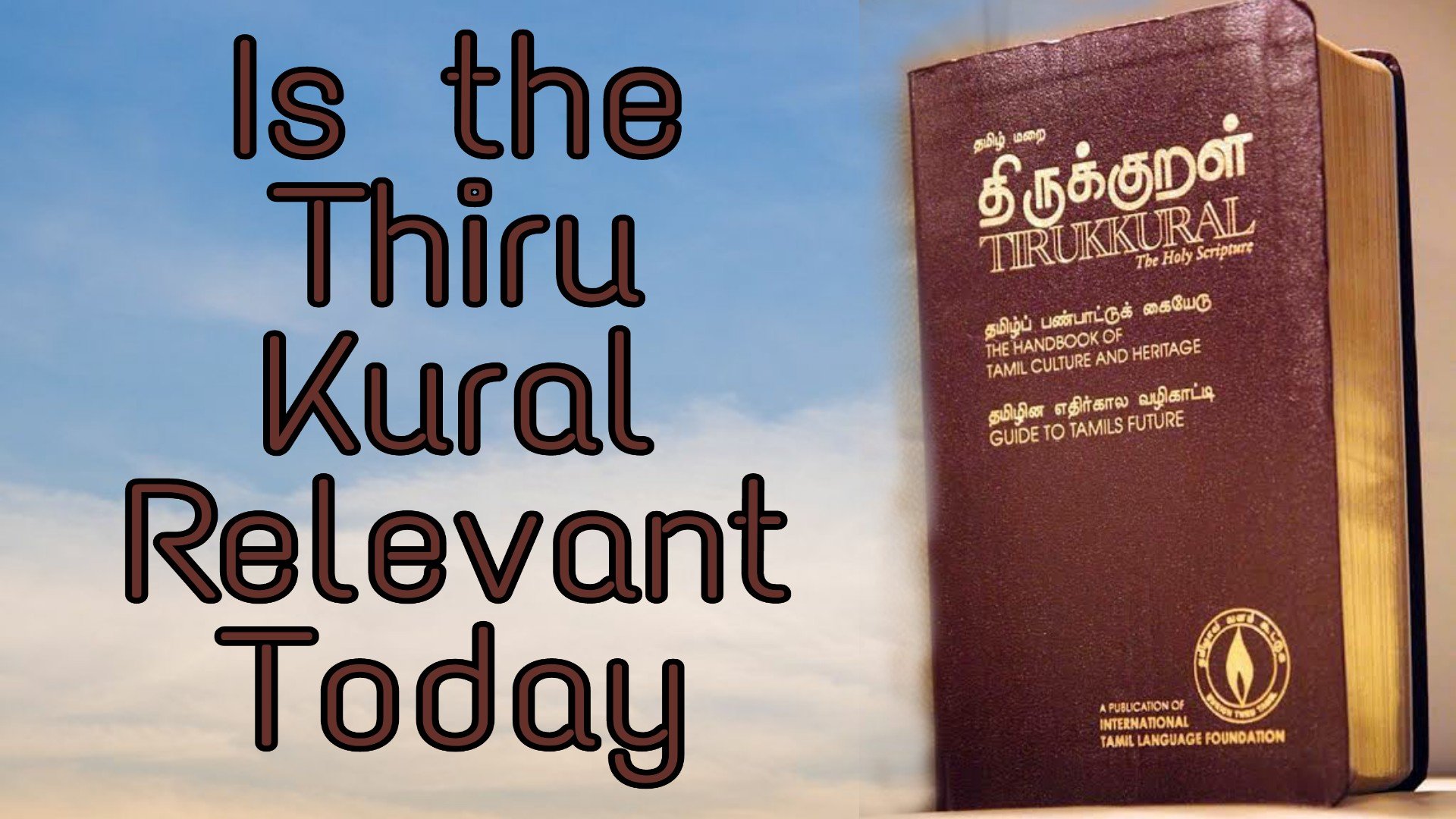Is The ThiruKKural Relevant Today
Thirukkural’s immortality and universality are unquestionable.
The well-known Tamil Poet of the Freedom Movement, Mahakavi Subramani Bharatiyar has acknowledged the greatness of Thiruvalluvar in the following words: “Tamil Nadu gave unto the World Valluvar and won thereby great renown.” Kural’s
immortality and universality are unquestionable. Its ethics and values are applicable to all religions, all countries and at all times.
That is why Mahatma Gandhi said; “Thiruvalluvar gave us the famous Thirukkural, holy maxims described by Tamilians as the Tamil Veda and by M. Ariel as one of the highest and purest expressions of human thought”.
Erudite Tamil Poets as well as the kings of the three Tamil Kingdoms – Chera, Chola and Pandya – acknowledged the literary greatness of Thirukkural. It is said that at the time of its first presentation to the king’s court, the Pandyan king wanted its greatness to be known to his whole kingdom. He put it to test by placing the manuscript along with those of other contemporary works in a golden lotus plank and
allowed it to float in the tank at the Madurai Meenakshi temple. The sanctified plank that would recognize only the masterpieces is said to have rejected all other works and retained only the Thirukkural.
People in Tamil Nadu worship Thiruvalluvar as a guru. They have erected a beautiful shrine to him and to his wife in the midst of a garden in Mylapore. It lies not far from the waves of the sea that are often referred to in his verses. Every year in the month of April, people celebrate a grand festival at the shrine. Another important memorial
to the immortal saint is Valluvar Kottam in Chennai, which is shaped like a temple chariot. A life size statue of Thiruvalluvar has been installed in the tall chariot. The 133 chapters of his work have been depicted in bas-relief in the front hall corridors of the chariot.
The auditorium at Valluvarkottam is said to be the largest in Asia with accommodation capacity for 4000 people. Recently, Tamil Nadu government has erected a magnificent 133-foot height statue of the saint denoting the 133 chapters in Thirukkural for tourists in the midst of sea in Kaniyakumari (Cape Comerin) at the confluence of the three seas. The statue dedicated at the dawn of the new millennium on 1.1.2000, stands out as a beacon light to guide human life forever.
Dr. V. C. Kulandaisamy has said: “ Thirukkural is neither Scripture nor an epic, but an extraordinary treatise on the Art of Living, which delves deep into the un-shifting foundations of human life and attempts to provide guidelines for individual persons”.
Valluvar has examined all aspects of life and analyzed life in its details and complexities. Though part II on wealth (Porutpal) is meant to be for kings and rulers, Valluvar has aimed to reach out to all.
Thirukkural is a contribution of a great genius. It is a good guide to individuals, groups and communities of persons, corporate houses, management institutes, government departments and officials and political leaders. As S M Diaz observes, though similar in some areas, Valluvar’s ideas are different in many respects from his predecessors like Plato Confucius and Kautilya who recorded their pragmatic ideas on State polity, and his successors like Machiavelli. His concepts are based on Dharma of a universal character on time and place. His moral tone is missing in all of them.
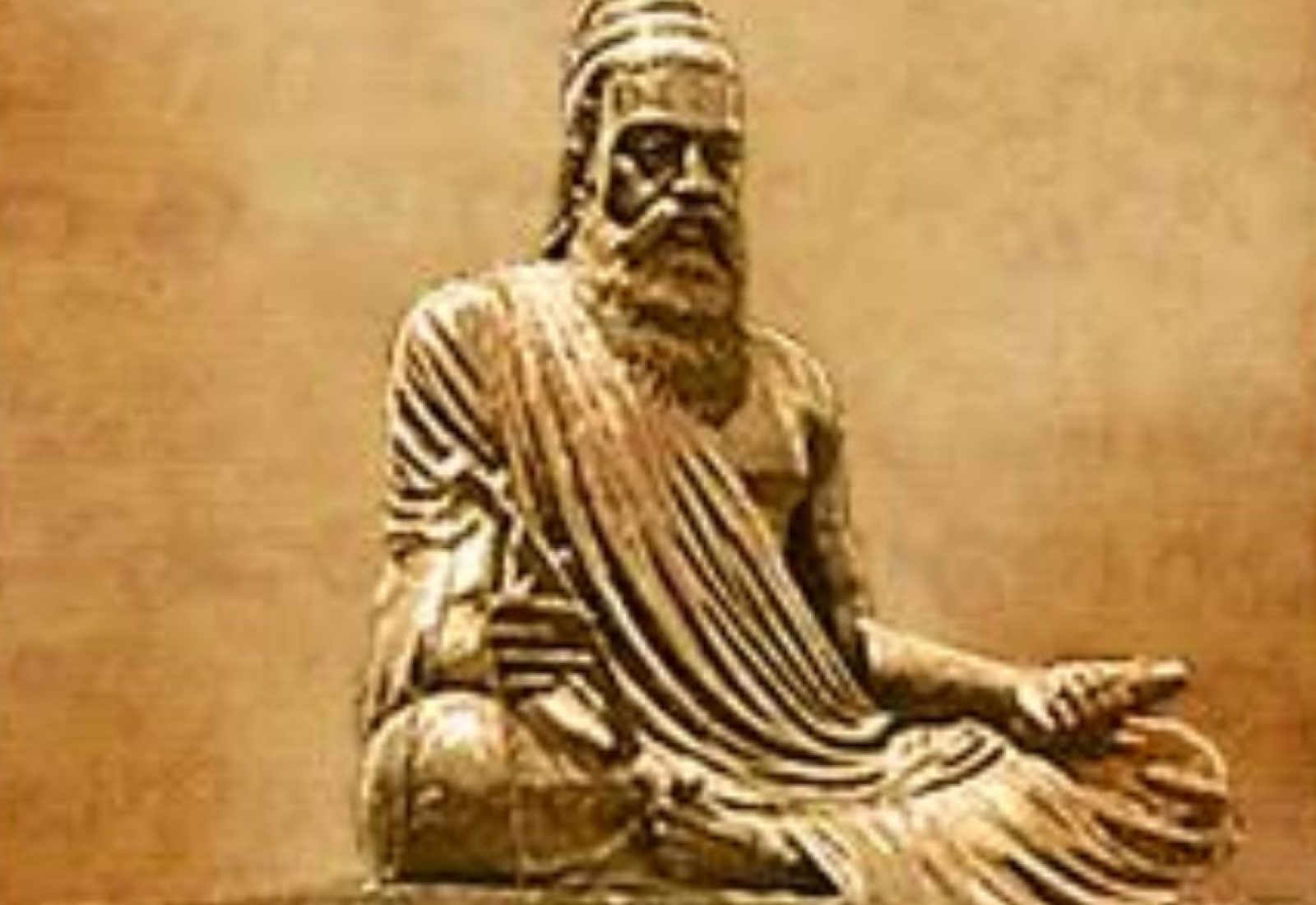
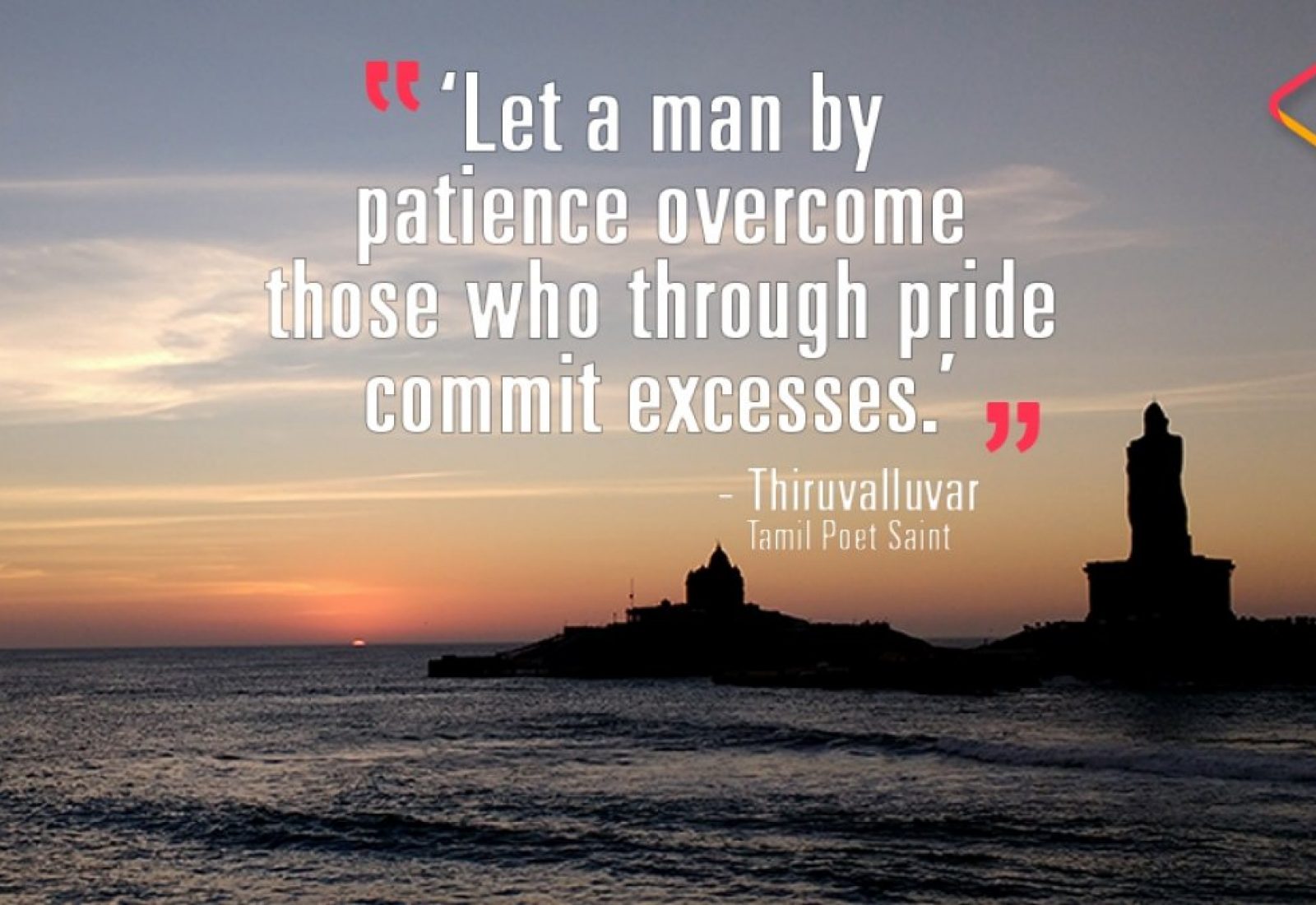
Once Rev. P. Percival, a missionary is Jaffna, wrote of the Kural, “Nothing in the whole compass of human language can equal the force and terseness of the couplets in which Valluvar conveys the lessons of wisdom.” Kural reveals that the doctrine of
non-violence obviously has had a great influence on him. He teaches deep faith in God, justice, mercy, compassion, friendliness, harmony and hard work. It is one of the few literary works that is being quoted widely by academicians, politicians and administrators as well as common people.
While being sworn in as the president of India, Dr. Abdul Kalam said that a country needs to have the characteristics as enshrined in Thirukkural and quoted from the Kural: “ Pini inmai Selvam Vilaivinbam Emam, aniyenba Nattirku vainthu”. That is “The important elements that constitute a nation are: being disease free; wealth; high productivity; harmonious living and strong defence.” It makes deep sense in this fast-moving world. If only there is more forbearance and patience, mutual respect and understanding, the world would become a better place for all of us to live. It is remarkable that the quintessence of some of the modern ideas of planning,
management and behavioral sciences are found elegantly and succinctly enshrined in some of the kurals of this part. The State, in Valluvar’s days, was primarily the king, and so, kingship is dealt with in substantial detail – the qualitative aspects of a king’s personality and leadership such as education, training for leadership and personal
conduct. While most of his precepts would primarily apply to king’s handling of projects, finance and warfare, many of the instructions on normal life’s requirements will apply equally to educated and virtuous people.Kurals reflect his outlook on social reforms. Take for evidence kurals 33 and 93 on “Kollanmai” – non-violence, and on “Kallunnaamai” – non-drinking (prohibition). He had the courage to point out the defects found in the society of his period, known as
the Golden Era of Tamil Sangam and bring about changes. He has been responsible for a great revolution in the Tamil country. And this revolution must continue all over and Thirukkural immortal and universal power must penetrate into every dimension of human life.
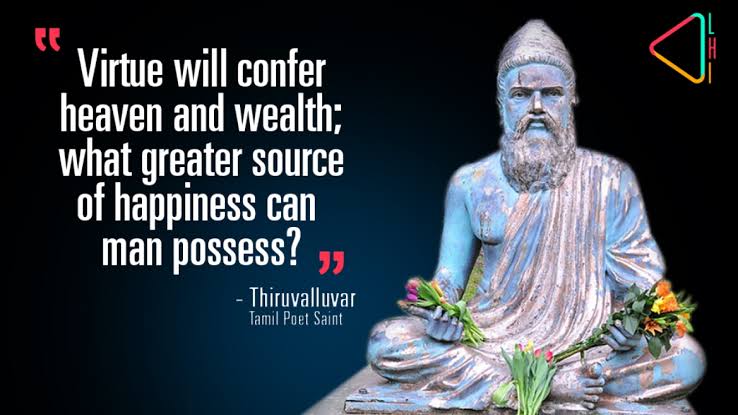
About Thiru Valluvar
Thiruvalluvar, the author of THIRUKKURAL was born about 30 years before Jesus Christ in Mylapore, the village of peacocks (Myl in Tamil means peacock), the present day Chennai, at a time when the Tamil Land was rich in culture, vivid in its life and adventurous in its commerce. Valluvars were the priests of outcaste people at that time. Tamilians take cognizance of the birth of Thiruvalluvar as a basis of Tamil calendar according to which we are now in the year 2039 of Thiruvalluvar Aandu (Year). Thirukkural is regarded as a renowned work, eulogized as a directory of code of conduct and ethics to humanity. The revered poet not only deals with the general administration, but also codified clear-cut directions to the mankind on how they should behave and act in a social, political, religious and family circles. As Emmons White has said, Thiruvalluvar was a kindly, liberal-minded man and his poetry is a kind of synthesis of the best moral teachings of his age. In the words of Dr. John Lazarus who has made an English translation of the Kural, “It is refreshing to think of a nation which produced so great a man and so unique a work. The morality he preached could not have grown except on an essentially moral soil.”
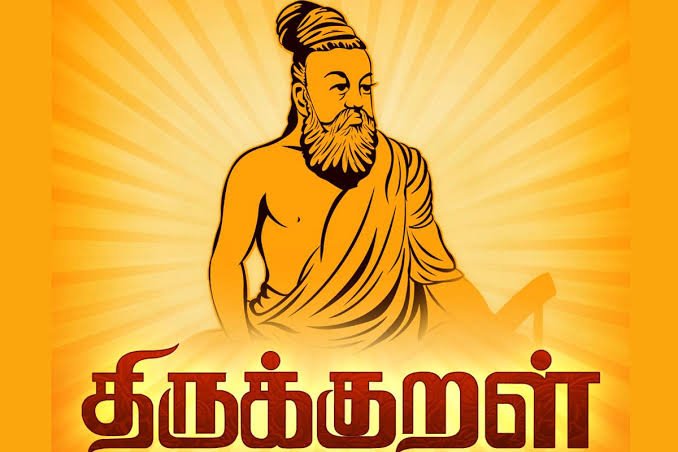
About Thiru Kural
Thirukkural, the precious gem among the classics enshrines in it 1330 couplets under 133 Chapters, and each chapter comprising 10 couplets. The chapters fall under 3 major parts: Virtue, Wealth and Love. The first part known as Arathuppal (on Virtue) describes the greatness of the individual man. The second part, Portutpal (on Wealth) is the largest one with 70 chapters (700 couplets) covering the essentials of life in society – State and its policies: Army (Padai), People (Kudi), Food (Koozh), Ministers (Amaichu), Allies (Nadpu) and Fortress (Aran). The third and last part, Kamathuppal (Inbathuppal) (on Love), portrays the victory of inner self. This classical work in Tamil has been widely translated in over 60 languages of the world. Nearly 300 years ago, the Italian Jesuit missionary, Constantius Beschi (known as Veeramamunnivar in Tamil) who came to Tamil Nadu in 1710, translated the Thirukkural into Latin. Rev. G U Pope who hailed Thiruvalluvar as “the Bard of Universal Man” translated the Kural and printed it first in English.

